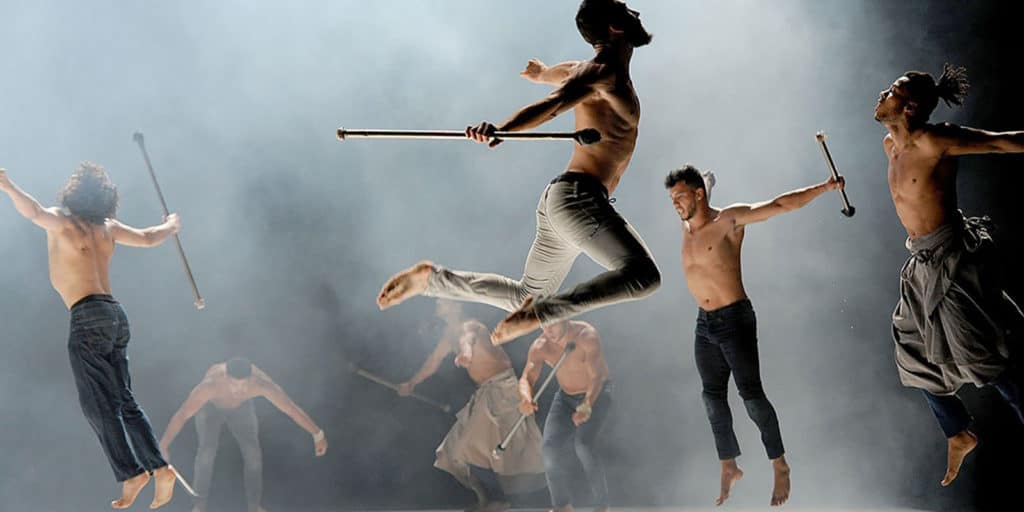Companie Hervé KOUBI is an all-male French contemporary dance company led by an Algerian-French choreographer who treats the Mediterranean as a lake and celebrates French + North African + Islamic + Oriental movement.
Cie Hervé KOUBI 2020
French Compagnie Hervé KOUBI celebrates its 20th anniversary with “Les nuits barbares ou les premiers matins du monde” (Barbarian nights or the first mornings of the world) at the Joyce Theater in Chelsea, Manhattan, Tuesday-Sunday, February 18-23, 2020.
Tickets from $46 at joyce.org
Special $10 tickets at JoyceCharge (212) 242-0800.
Les premiers matins du monde
The choreography is French for “Barbarian nights or the first mornings of the world.” What an interesting idea.
Hervé Koubi always thought he was French-Algerian, what the French call “pied noir” (black foot). It is slang for French born in Algeria. It’s like criollo in the Hispanic Americas or creole in the French Americas.
On his deathbed Koubi’s father turned his world upside down by revealing that he is not French-Algerian, but Algerian-French.
Identity challenges cause most people to search for an answer to the question, “Who am I?” It’s the essential diaspora identity question. Any honest investigation of humanity leads to the same conclusion: that we are all humans from Africa.
Koubi’s dance company is made up of dancers from Algeria, Burkina Faso, France and Morocco. His choreography treats the Mediterranean Sea correctly like a lake, a connector of all who live on its shores. There is a pan-Mediterranean culture, just as there is a pan-Caribbean culture.
It’s fun to consider who created “falafel,” the delicious fried chick-pea patties. Egyptians say they did it first. Israelis say they did it. Lebanese and Syrians say they did it, and Turks and Greeks say they did it. Even Yemenis say they did it.
This style of cooking is common in the dry regions of North Africa, but it doesn’t matter who did it. Falafel is all over the western Mediterranean, and is just as delicious in one country or one restaurant as the next.
In ancient times the Mediterranean Sea functioned like a lake. People sailed from one end to the other. That’s how we got Greeks in Turkey and Italy, and Jewish communities on the coast of Spain. People went all over.
“Les nuits barbares ou les premiers matins du monde” explores this concept.
We call others “barbarians” without recognizing our own barbarism, or the “other’s” humanity. The human race comes from Africa and on the first nights of the world, or the first nights of humanity, humans left Africa in multiple migrations through what we now call the Middle East. Recent DNA studies show that some even went back to Africa.
We are often taught that “others” are primitive, even less than human. Demonizing the “other” is the first step in a process of theft, rape, murder and enslavement. Don’t believe it. Homo sapiens which is who we are (all of us), developed around 300,000 years ago in East and South Africa.
When you look at so-called “primitive” cultures, you can’t help but be astounded at how clever “they” were and how “they” must have had highly developed societies in order to create the artifacts we find today.
It’s because they are us. “They” are just as smart as we are. “They” are us. Maybe “they” were even smarter because they didn’t destroy their world. “Primitive” humans lived in symbiotic relationships with the land.
So with his title, Houdé may be saying that what we might have called “barbarian nights” are actually the dawn of humanity. The idea of nations is a late and now rather dated concept. There is only one earth and only one race of humans on earth. We have been migrating since we stood on two feet.
As Hervè Koubi learned from his father, there is no “them,” there is only “us.”

